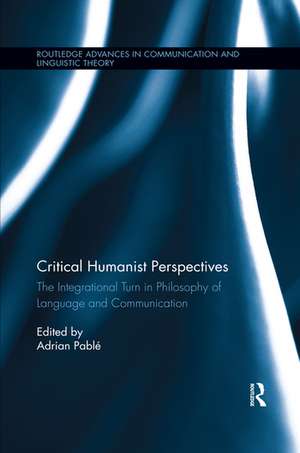Critical Humanist Perspectives: The Integrational Turn in Philosophy of Language and Communication: Routledge Advances in Communication and Linguistic Theory
Editat de Adrian Pabléen Limba Engleză Paperback – 26 sep 2019
| Toate formatele și edițiile | Preț | Express |
|---|---|---|
| Paperback (1) | 389.38 lei 6-8 săpt. | |
| Taylor & Francis – 26 sep 2019 | 389.38 lei 6-8 săpt. | |
| Hardback (1) | 765.43 lei 6-8 săpt. | |
| Taylor & Francis – 22 mai 2017 | 765.43 lei 6-8 săpt. |
Preț: 389.38 lei
Nou
Puncte Express: 584
Preț estimativ în valută:
74.51€ • 78.01$ • 61.80£
74.51€ • 78.01$ • 61.80£
Carte tipărită la comandă
Livrare economică 10-24 aprilie
Preluare comenzi: 021 569.72.76
Specificații
ISBN-13: 9780367410711
ISBN-10: 0367410710
Pagini: 296
Ilustrații: 4
Dimensiuni: 156 x 234 x 18 mm
Greutate: 0.45 kg
Ediția:1
Editura: Taylor & Francis
Colecția Routledge
Seria Routledge Advances in Communication and Linguistic Theory
Locul publicării:Oxford, United Kingdom
ISBN-10: 0367410710
Pagini: 296
Ilustrații: 4
Dimensiuni: 156 x 234 x 18 mm
Greutate: 0.45 kg
Ediția:1
Editura: Taylor & Francis
Colecția Routledge
Seria Routledge Advances in Communication and Linguistic Theory
Locul publicării:Oxford, United Kingdom
Public țintă
Postgraduate and ProfessionalCuprins
PART I
1 Introduction: humanism, existentialism and integrational semiology (Adrian Pablé)
PART II Integrating humanism
2 Secular humanist discourses on rationality: exploring questions in the philosophy of language and communication (Adrian Pablé)
3 Bedrock concepts and integrational theory: selves, animals and legal persons (Christopher Hutton)
4 The nature of language and the language of nature: Rabindranath Tagore’s Sabda Tattwo or The Essence of Words as an integrationist text (Rukmini Bhaya Nair)
5 An integrationist perspective on African philosophy (Sinfree B. Makoni and Cristine G. Severo)
PART III Integrating linguistics
6 Can integrational linguistics be integrated with (critical) discourse analysis? (Michael Toolan)
7 Indeterminacy in sociolinguistic and integrationist theory (Jon Orman)
8 Towards human concepts of language meaning and text comprehension (Charlotte Conrad)
PART IV Integrating systems and agency
9 The notion of an integrated system (Dorthe Duncker)
10 Humanist machines: an integrationist critique of mechanical models (David Bade)
PART V Integrating freedom and creativity
11 Mr. Micawber anticipates Feist : transformations of mental labour (Julian Warner)
12 Language and freedom vol 1: the abstract and the concrete (Peter E. Jones)
13 Emotional labour and the neoliberal entrepreneurial self at work and in the home: emotions as privatised individual capital or revolutionary social praxis? (Paul J. Thibault)
PART VI Integrating humanist models of education
14 Freedom of speech in a therapeutic age (Dennis Hayes)
15 ‘Crazy English’ and individual English learners: an integrationist critique of English education as a business in China (Feifei Zhou)
PART VII
Discussion: integrationism, anti-humanism and the suprasubjective (Paul Cobley)
1 Introduction: humanism, existentialism and integrational semiology (Adrian Pablé)
PART II Integrating humanism
2 Secular humanist discourses on rationality: exploring questions in the philosophy of language and communication (Adrian Pablé)
3 Bedrock concepts and integrational theory: selves, animals and legal persons (Christopher Hutton)
4 The nature of language and the language of nature: Rabindranath Tagore’s Sabda Tattwo or The Essence of Words as an integrationist text (Rukmini Bhaya Nair)
5 An integrationist perspective on African philosophy (Sinfree B. Makoni and Cristine G. Severo)
PART III Integrating linguistics
6 Can integrational linguistics be integrated with (critical) discourse analysis? (Michael Toolan)
7 Indeterminacy in sociolinguistic and integrationist theory (Jon Orman)
8 Towards human concepts of language meaning and text comprehension (Charlotte Conrad)
PART IV Integrating systems and agency
9 The notion of an integrated system (Dorthe Duncker)
10 Humanist machines: an integrationist critique of mechanical models (David Bade)
PART V Integrating freedom and creativity
11 Mr. Micawber anticipates Feist : transformations of mental labour (Julian Warner)
12 Language and freedom vol 1: the abstract and the concrete (Peter E. Jones)
13 Emotional labour and the neoliberal entrepreneurial self at work and in the home: emotions as privatised individual capital or revolutionary social praxis? (Paul J. Thibault)
PART VI Integrating humanist models of education
14 Freedom of speech in a therapeutic age (Dennis Hayes)
15 ‘Crazy English’ and individual English learners: an integrationist critique of English education as a business in China (Feifei Zhou)
PART VII
Discussion: integrationism, anti-humanism and the suprasubjective (Paul Cobley)
Descriere
This is a collection of scholarly reflections on the theme of humanism from an integrational linguistic perspective. It studies humanist thought in relation to the philosophy of language and communication underpinning it, and the question whether being a ‘humanist’ binds one to a particular view of language.












